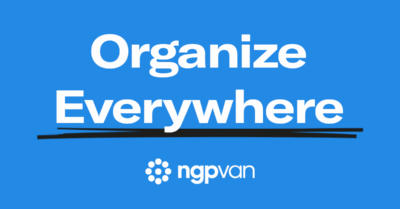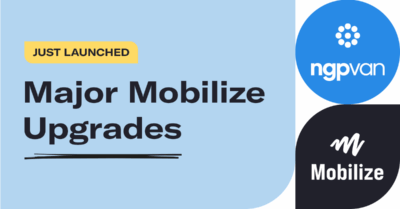Running for State Leg: Two Successful Candidates Weigh In
State legislatures are too often overlooked. As we focus on the day-to-day drama in Washington, it’s easy to forget that state legislators determine everything from Medicaid expansion to congressional redistricting.
Running for your state legislature is a great way to push for progress in your state. We chatted with two state legislators to get their advice about how to field a winning campaign. When you’re ready to launch your own campaign, check out our guide here.

Gloria Johnson: District 13 in the Tennessee House of Representatives
 Gloria Johnson, who represents Knoxville, is persistent. She won her first house seat in 2012. After losing her seat in 2014 by less than 200 votes, Gloria ran two more cycles, reclaiming it in 2018 with a margin of more than 2,000 votes.
Gloria Johnson, who represents Knoxville, is persistent. She won her first house seat in 2012. After losing her seat in 2014 by less than 200 votes, Gloria ran two more cycles, reclaiming it in 2018 with a margin of more than 2,000 votes.
She is driven by a commitment to public service. Gloria spent 27 years a public school teacher serving students with special needs before she left teaching to organize for healthcare reform full-time.
Why did you first decide to run for office?
I was not involved in politics until the Obama campaign when I took time off from teaching and became an organizer. After he won the election, I wanted to stay involved.
In 2011, a special election came up in Knoxville and there were three Republican women in the race, but no Democratic challenger. I went to a couple of forums and realized that none of the candidates were addressing key issues that so many folks in the district care about.
The folks at the state party asked me to run. They knew that the odds were against me, but they suggested that I get into the race to change the conversation. So that’s what I did.
We wanted to talk about healthcare and public education. The only way to do that is by getting someone in the race. It’s about changing the mindset from ‘We can never win this race’ to ‘Hey! Let’s get in there and start a conversation about the things we care about.’ You’ll find that folks on the other side care about the same issues.
How do you shift the conversation around policies?
I spent the last two years working to save the ACA by highlighting people’s stories around the state. Storytelling is such an important organizing tool. When you highlight the stories of people whose lives are impacted by the policies made in Nashville, folks start to realize that the issue really hits close to home.
When they learn that their neighbor, who’s been diagnosed with cancer is unable to get care, folks start to understand what’s at stake. It really changes their mindset about healthcare. Now 66% of Tennesseans, including a majority of both parties, agree that we need to expand Medicaid.
How do you prioritize your time when you’re campaigning?
I focus on personal voter contact. A lot of candidates get caught up in going to functions and political meetings — places like that. I know that my most valuable time spent is talking to registered voters.
If you’re underwater in your district — if you’re a Democrat in a Republican district — you’ve got to change some hearts and minds. The best way to do that is by showing up on someone’s doorstep or by making a personal phone call. That’s how I spend the bulk of my time and that’s what my volunteers do as well. It’s the best way to get voters to understand where you’re at. Sometimes they even come around to your point of view.
What advice do you give to women who are running for office?
It’s so exciting to see women run for office because a lot of the women who step up are not politicians and that’s what people want to see. They want fresh faces and candidates who are committed to solving problems.
When women win, they’re more likely to introduce legislation that is about family, and they’re more collaborative. Women get more cosponsors on their bills. We need more female leadership in Tennessee. Right now, only 15% of state legislators in Tennessee are women.
I’m actually running an Emerge Tennessee training soon and they’ve asked me to talk about losing. It’s an important conversation. Because the reality is that you might have to be out there for a while, building up name recognition and earning the public’s trust. This is especially true if you’re a progressive in a red district. When I lost races, I stayed involved in my community.
Running for office shouldn’t be a one and done. It’s a long game. Continue to work and speak out on issues. Be seen. People will come to trust you and know that you care about the community.
The candidates that I support through Emerge don’t always win. But did they move the dial? Absolutely. All of our candidates move the dial quite a bit.
Rui Xu: District 25 in the Kansas House of Representatives

Rui Xu, who represents Westwood, ran for office like a millennial and won. He drew upon his marketing experience to seamlessly integrate digital into his campaign. A thoughtful online presence and impressive fundraising numbers helped establish his credibility early in the race.
The son of immigrants, Rui is the first Chinese-American to ever serve in the Kansas Legislature and the only naturalized citizen and only Asian-American currently serving.
Why did you decide to run for office?
After the 2016 election, I came to the realization that there are a lot of people putting their time, effort, and money into fighting against the things that I love the most about this country. People were trying to dismantle the things that inspired my parents to move to America in the first place.
I realized that I was not doing enough to actively fight for those things. I knew that I wanted to get more deeply involved in politics in some way — I thought that would be for other candidates, but someone let me know that the Republican state rep in my district was running unopposed.
The first night that I had any inkling that I wanted to run was when Doug Jones won the Senate race in Alabama. I thought, ‘Wow. If he can win in Alabama, we can do some things in Kansas.’
Flash forward a year and we did some things in Kansas. Sharice Davids made history, flipping a Congressional district that represents the Kansas City suburbs. She is the first Native American woman and the first lesbian Native American elected to Congress. Laura Kelly won the governorship after having won the endorsements of 28 former Republican lawmakers. It was a great year for Democrats in Kansas.
Going into this race, I knew my district, I knew the type of year that it was going to be, so I thought if there was ever a year that a 29-year-old immigrant with a funny looking name could win, it would be this one.
What issues did you center your candidacy on?
For me, it was about selling people on the idea of the future. Young people are going to be the ones that have to deal with the effects of climate change. We’re gonna have to be the ones that deal with the effects of the new federal tax law that really helped out the wealthy at the expense of the middle class and the poor. We need more representation from that younger perspective of folks who hold that long-term view.
What do you wish you would’ve known about running for office?
I wish I would’ve known anything. Having pre-existing knowledge on how to campaign and canvass would’ve been nice, but we made it work.
One of my advisors actually made this analogy which I think is super apt: Running for office is kind of like someone coming to you and being like, ‘Hey man, do you wanna go to the moon?’ and you’re like ‘Yeah! That sounds like a great idea. Let’s go to the moon.’ And then they’re just like, ‘Okay, build a spaceship. Bye!’
So, you’re left to figure out ‘What does a spaceship look like? What do I need to build a spaceship?’ You don’t know any of that. Eventually, I got to the point where I’d gone to enough trainings and gotten enough advice that I knew that what that spaceship was supposed to look like, but in the beginning stages I had no idea.
How did you kickstart your fundraising operation?
My first round of fundraising was different from most people’s. There is an app that most Chinese people in the country use called WeChat, which is similar to Whatsapp.
The first day that I decided I was running, my Dad sent my fundraising link out to a bunch of his friends on WeChat and they sent it to a bunch of their friends. Apparently, there are 100-person WeChat groups and each person would send it to another 100 person group. Over the course of a day or two, I’d raised about $6,000 which really helped legitimize my candidacy early on.
But after that slowed down, I started to make a list of everybody that I’m Facebook friends with and everyone in my phone and ranked them by their propensity and ability to give to the campaign.
I did some phone time, but if my friends see that I’m calling them, they’re like ‘that’s weird’ you know? So, I found that it was just as effective for me to send out a bunch of Facebook messages with an ask and a link.
I think it’s a generational thing, you know? There are friends that I literally haven’t talked to in the six years since college. It would’ve been weird for me to call them, but there were fine throwing me $25 over Facebook.
What role did digital organizing play on your campaign?
Digital played a significant but not the primary role in my campaign. I did marketing analysis as a living, so this is something that I think a lot about. Direct voter contact is always the most important, right? Nobody is just going to randomly see a Facebook post of mine, even if it’s amazing, and be like ‘Oh yeah! That’s the guy I’m going to vote for.’
But, if I knock on their door first and we have a conversation and they’re like ‘Oh yeah, I like that Rui guy’ and then they see that Facebook post, that just solidifies their support for me. I see social media as really solidifying voters that are kind of 50/50 or already leaning my way.
In the early days, I got a lot of compliments on my website for being really professional. It helped legitimize my candidacy. Early on in the race, it’s hard for folks to tell who is going to put the work in to win. My website and professional social media appearance signaled that I was serious.
What advice do you have for young people that want to run for office?
Do it. Run for office. That’s my advice.
I think a lot of times people doubt — and I still experience this — they doubt whether or not their voice really needs to be heard or if their presence really matters. The longer that I’ve served in the legislature, the more that I realize that it really, really does.
There are often reception events at the capital and the other night they hosted an Oriental Night. So I had to write them an email and be like ‘Hey guys, I’m not mad, but just so you know that term is pretty outdated.’ And they were just like ‘Oh! I’m so glad that you said something. No one has really said anything about it before. Won’t happen again.’
That’s very minor in the big scheme of things, but that’s why representation matters. Representation will inevitably have an effect on policy as well. Having a younger perspective in the room matters, too. I look at policy with a 30-, 40-, and 50-year time horizon. That perspective matters a lot, right? Rather than having a 5- or 10 year-view.
So if you’re thinking about running, just do it. If you aren’t willing to fight for it, there’s no promise that there’s somebody else out there who is.
Ready to run? We’re here to help. Download our guide to running for the state legislature here or click the image below.




